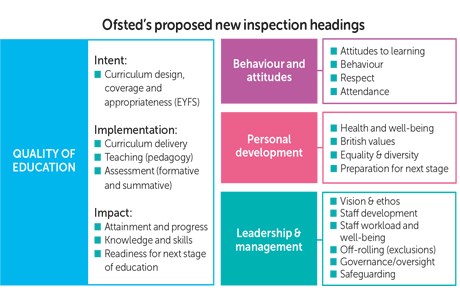Unpicking Ofsted Reports, Part 11: Teaching and Learning and the New Inspection Framework
Pennie Akehurst
Monday, December 10, 2018
Former head of early years Pennie Akehurst looks forward to the Education Inspection Framework, set to launch in September 2019

Information about Ofsted’s new inspection framework has been coming out in dribs and drabs over the past few months. What follows is my interpretation of Ofsted’s intentions for teaching and learning and what this means for practice (given what we know about inspection trends).
Chief inspector Amanda Spielman has been very clear that there will be more of a focus on teaching and learning.
Key points:
- ‘Outcomes for children’ and ‘teaching, learning and assessment’ will be combined to form inspection heading ‘the quality of education’.
- ‘Personal development, behaviour and welfare’ will be separated into ‘personal development’ and ‘behaviour and attitudes’. This has to mean a greater level of scrutiny of practice.

But we know not all settings currently demonstrate effective teaching, learning and assessment practices.
Under Planning and Challenge (the second-highest trending inspection area this year), Ofsted highlighted the need for settings to:
- use information from ongoing observations and assessments to plan appropriate challenges for all children
- ensure activities are appropriately differentiated, taking account of children’s ages, interests and levels of understanding
- ensure adults plan meaningful activities, which cover all areas of learning. (Many recommendations requested more focus on similarities and differences, the use of number and problem-solving skills, early writing opportunities and physical development)
- ensure staff assess skills and use this information to plan an exciting mix of adult-led and child-initiated activities that challenge children and meet their needs.
And under Observation, Assessment and Next Steps (the sixth-highest trending inspection area), Ofsted highlighted the need to:
- ensure that all staff complete regular and accurate assessments that provide a clear view of what children know, understand and can do
- use assessment information consistently to plan appropriate next steps in development and learning
- use information from parents to help establish starting points on entry
- ensure that observation and assessments focus on children’s interests as well as next steps
- ensure that observations and assessments are provided for all areas of learning, giving a rounded view of what children know, understand and can do.
We have plenty of time to make sure that the ‘what we do’ with our children is effective. So what kind of things could we be focusing on?
A good grounding in child development will become even more critical in the months ahead. We also need to ensure that practice is consistent across our staff teams. So here are a few questions that you may want to use in your setting.
- What quality assurance or moderation activities do you have in place that help to ensure that observations and assessments accurately reflect what children know, understand and can do?
- How do you know children’s next steps are meeting each child’s individual needs?
- What systems are in place to ensure a balanced coverage of all areas of learning?
- How do you know that staff are using children’s changing interests to enhance the learning environment?
- How are the ‘firsts’ that happen at home and significant events captured from parents?
- How do you know children are receiving an appropriate level of challenge?
- How often are practitioners required to meet with you to unpick what is happening for individual children?
- Is there a focus on the effectiveness of teaching and learning in each member of staff’s supervision conversations (i.e. strengths in practice and areas for development)?
- Where weaknesses in practice are identified, are staff members given personal development targets?
By reviewing the effectiveness of our monitoring activities for teaching and learning now and tweaking our approach, we will be in a better position to respond to the changes to our inspection framework.
Pennie Akehurst is managing director of Early Years Fundamentals, www.eyfundamentals.org




